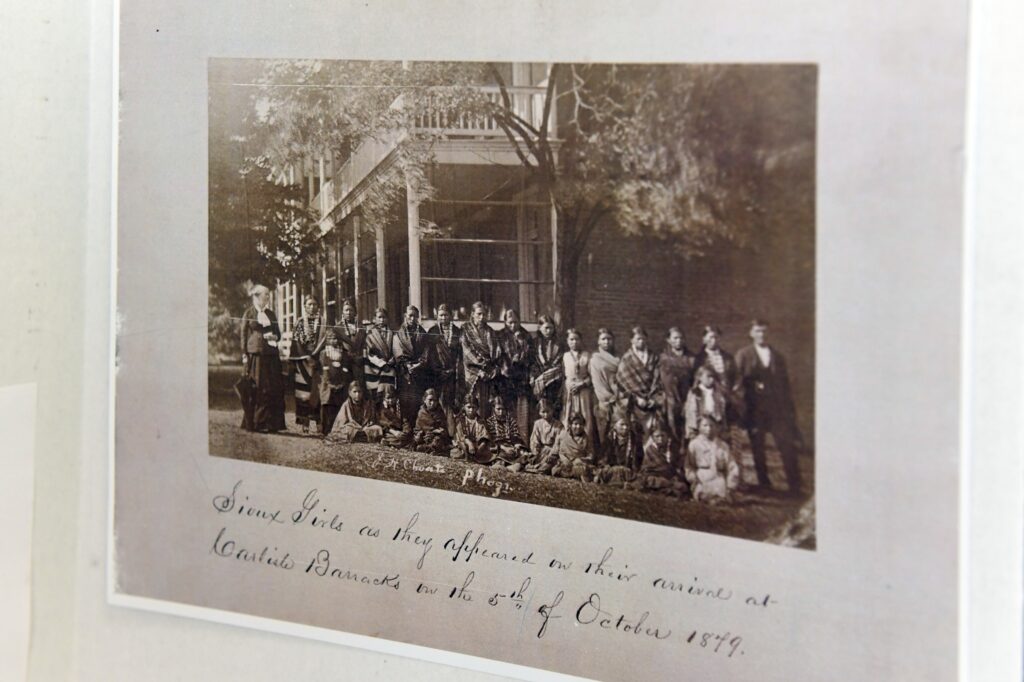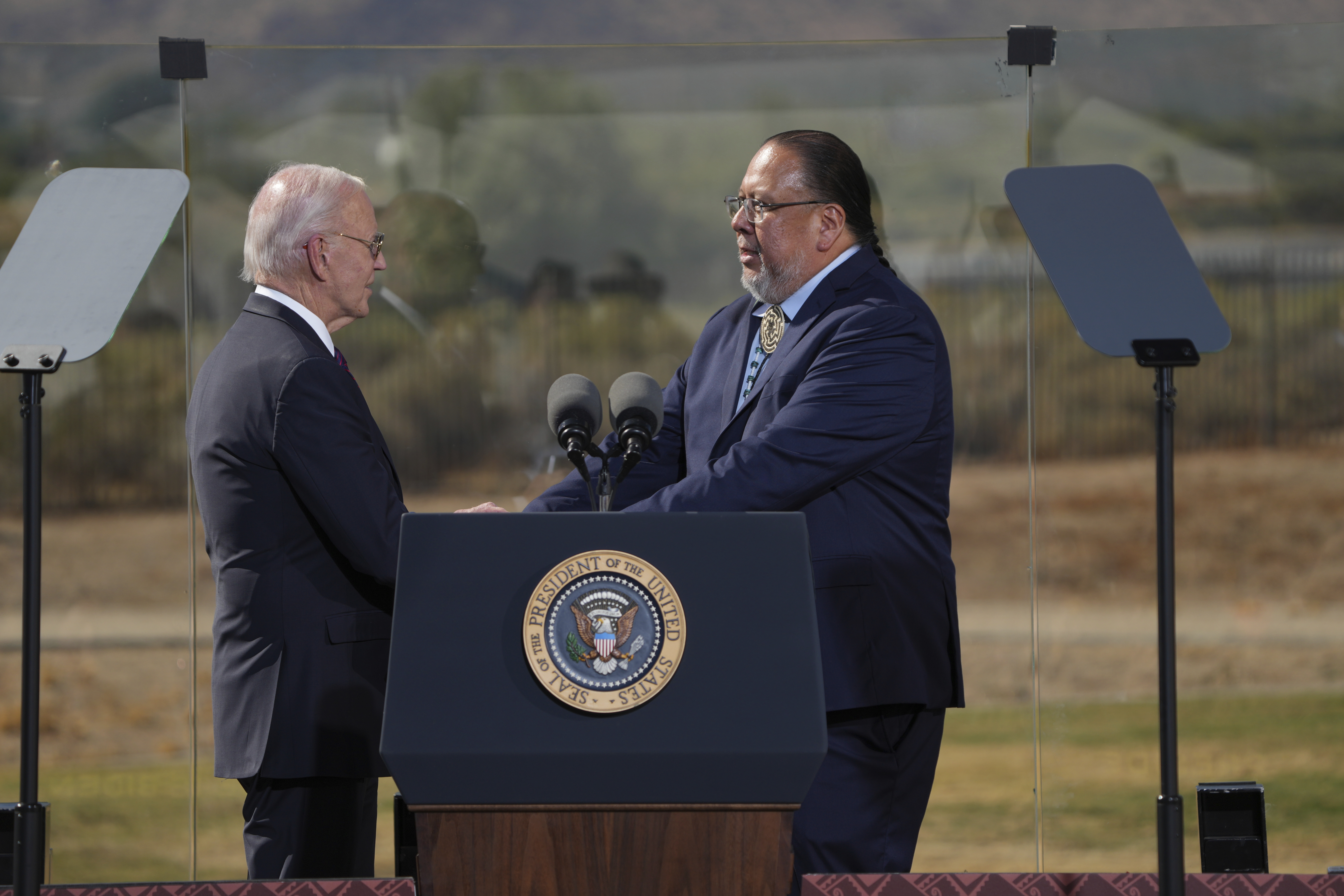U.S. President Joseph Biden issued a national apology to Native Americans for the unspeakable harm caused to Native peoples at Federal Indian Boarding Schools. However, some question whether they are empty words in a protracted history of broken treaties.
President Biden proclaimed November 2024 as National Native American Heritage Month, claiming a recommitment to respecting tribal sovereignty and self-determination and working in partnership with Tribal Nations to bring new prosperity and security to Native peoples.
During a news conference at the Gila River Indian Community in Arizona on Oct. 25, the president stated that Native peoples have built and sustained powerful Tribal Nations, and that still benefits America today. “However, our nation’s failed policies of the past subjected generations of Native peoples to cruelty, violence, and intimidation.
The forced removal of Native peoples from their homes and ancestral homelands; attempts to assimilate entire generations; and stripping of Indigenous peoples of their identities, cultures, and traditions are some of the darkest chapters of our Nation’s history,” stated President Biden.
Given the number of U.S. presidents since the atrocity began, some question why it took the 46th presidential administration of America and an outgoing president to now come forward with an apology.

“It doesn’t sound like an apology, to me,” stated Student Minister Abel Muhammad, who serves as representative to the Latin American and Spanish-speaking community for the Honorable Minister Louis Farrakhan and the Nation of Islam.
He spoke on the topic during a recent podcast interview on October 26. “Great. We give you applause, President Biden, that it took 46 presidents to acknowledge and to accept what had been pointed out as wrong.
But there’s more steps in this process, now. I didn’t hear a repentive tone. I haven’t seen anything that is done to atone for what was done,” he continued. Student Minister Abel Muhammad stressed that an apology is just one step in the Eight Steps of the Atonement process given by Minister Farrakhan.
“That’s good, but it doesn’t change anything unless you continue the process, and you can’t make me believe that you’ll give justice to the Native people and deny Black people justice.
You can’t make me believe you’ll give justice to the Native people and not give justice to those who’ve come from South America, Latin America, because you’ve destroyed their economies and their civilizations, their governments, you’ve undermined them, forcing them to flee from these places.
You can’t make us believe that you’re really remorseful in the mistreatment of these Indigenous people and support the bombing and the genocide of the Palestinian people in their ancestral home. You can’t make us believe that after you broke hundreds of treaties, now you’re sorry,” he stated.
Others in the Native American and Indigenous community stated the president’s apology was a nice gesture but noted that it came less than two weeks before an election and he was speaking in a critical state where the Native people make up five percent of the voting bloc.
There has been a huge emphasis on listening to Native Americans in Arizona, but the over 492 federally and non-federally recognized tribes in America should be listened to, in part because they are First Nation people, said YoNasDa Lonewolf, an activist and daughter of Wauneta Lonewolf, an Oglala Lakota from Pine Ridge, South Dakota.
Her mother, uncles and some of her aunts went to the Indian boarding schools, she stated. “I remember my mother talking about the horrific stories that she went through with the nuns and with the priests at the Indian boarding schools, of stripping her from her language, her family, and having to get her hair shaved and cut,” she told The Final Call.
It is important to note that in 2024, the Declaration of Independence still labels Native Americans as “merciless Indian savages,” she stated. No matter how much money the federal government allocates toward programs, the number one thing Indigenous people have been fighting for is rescinding the Doctrine of Discovery based on the Papal Bulls, which still applies in the U.S. Supreme Court, Ms. Lonewolf added.
In March 2023, the Vatican responded to Indigenous demands and formally repudiated the “Doctrine of Discovery,” the theories backed by 15th-century “Papal Bulls” that legitimized the colonial-era seizure of Native lands and form the basis of some property laws today.
According to “Vatican rejects doctrine that fueled centuries of colonialism,” according to an April 4, 2023 AParticle. That doctrine was cited as recently as 2005 in a U.S. Supreme Court decision involving the Oneida Indian Nation, the article noted.
“That just goes to show if the highest court of America still abides by the Doctrine of Discovery, then that means that they feel that if those Papal Bulls were rescinded, then everything that was founded or stolen after that was signed, then it’s null and void.
And, they do not want that to be rescinded, because we could begin to start saying, ‘Oh! Your Constitution, everything is nothing.’ It’s also saying, ‘We’ve stolen America,’” Ms. Lonewolf argued.
“These are the actions behind an apology that myself, as an enrolled member of the Oglala Lakota Nation, and I guess it’s because of the revolutionary in me, the freedom fighting in me, that until those apologies, with those actions, are done, then your apology is nothing but feathers to me. Yes, it may feel good for the moment, but the thing is that we are still not being represented,” she continued.
Despite President Biden being the first sitting U.S. president who formally apologized, it is a beginning point to reconciliation, reparations and also recognition that the U.S. has a terrible record of enslaving Indigenous people, said Hector Perez Pacheco, a Quechua from the Confederations of Tawantisuyu.
According to the National Native American Boarding School Healing Coalition, there were more than 523 government-funded, and often church-run schools across the U.S. in the 19th and 20th centuries.
“The boarding schools were places where they would strip the spirit of the person and re-indoctrinate them in the eyes of the colonizer. … Their attempt was to take away the Indian from us, from Indigenous people,”
Said Mr. Pacheco. “They would cut our hair, they would put us in their clothing. They would not allow us to speak our language. They would beat us, rape us, kill us so that they could have a slave or a person to do their will,” he continued.
Despite it all, many, like his father, who were in boarding schools did their best to maintain their identity and who they are, he said. His father was fluent in their language going in, but was beaten every time he spoke it, according to Mr. Pacheco.
“We hope that this is the beginning of an era of repair,” said Nick Tilden, a citizen of the Oglala Lakota Nation, and president and CEO of the NDN Collective. It is an Indigenous-led organization dedicated to building Indigenous power through organizing, activism, philanthropy, grant-making, capacity-building and narrative change.
“This is one of the most historic moments in the history of this country and its relationship with Indian people,” Mr. Tilsen stated during a recent interview with broadcast journalist Amy Goodman on Democracy Now.
“What this has meant and means for Indian Country is that we hope that this is the beginning of an era of repair—repair between the United States government and the Indigenous People, of the first people of this land,” stated Mr. Tilsen.
NDN Collective called on President Biden to take action, before he leaves office by rescinding the Medals of Honor given to the 7th Calvary at the Massacre at Wounded Knee in 1890. That would be a way to invoke healing, he said.
They are also calling for executive clemency for Leonard Peltier, the longest-living Indigenous political prisoner—or some strongly argue, prisoner of war—in American history, who is also a boarding school survivor.
—Charlene Muhammad, National Correspondent













